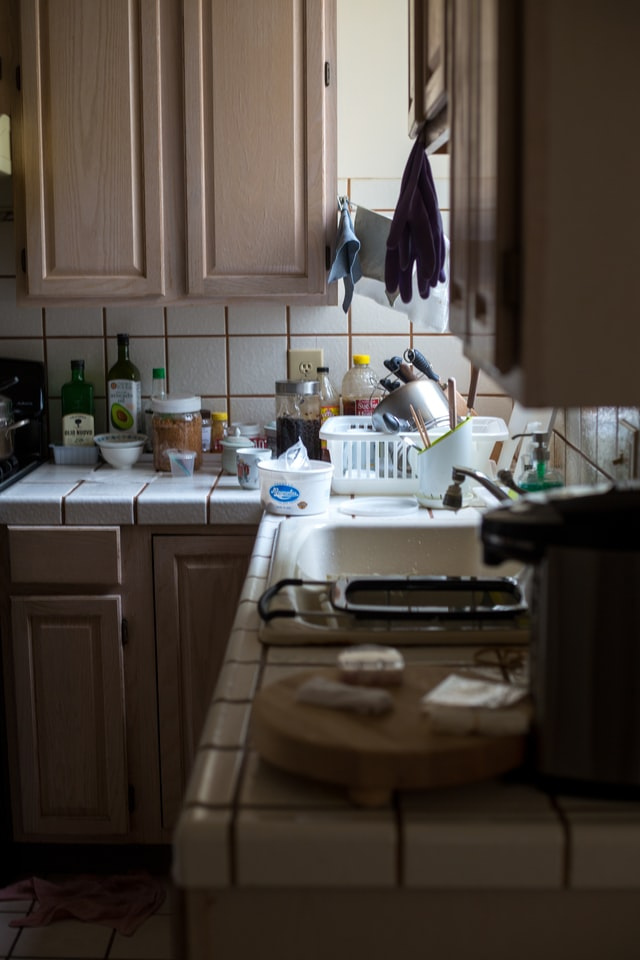Which Parts of your Home are the Dirtiest and What are the Best Ways to Tackle Them?

The right house cleaning skills are the difference between a home that is pretty clean and one that is spotless. And if you’ve been trying to figure out how to clean your space so that it looks picture-perfect, then this list of house cleaning secrets will help you tackle the dirtiest parts of your home easily and efficiently.
Here at Spacer, we love to share our cleaning tips with fellow organisation enthusiasts. So break out the cleaning products and let’s get your home sparkling!
Tip #1: Make a plan
Keeping a clean home can be overwhelming given all of the different tasks that need to be completed. And to be fair, much of our time and cleaning efforts go towards regular maintenance: cleaning the most visible surfaces like kitchen counters and floors, washing and folding clothes, and doing the dishes. These ongoing chores can make it difficult to find the energy and time to tackle dirtier areas of the home.
If that’s the case, then simply having a plan can make tasks more manageable. With a calendar, you can assign deep cleaning tasks to different days of the week and include the other members of your household in the process. This might look like scheduling in an hour to clean the kitchen appliances on Wednesdays or stripping and washing the bed linens on specific dates.
Here are a few helpful guidelines that can help you put together your cleaning schedule:
-
All surfaces in your home, including kitchen counters, sinks, bathroom counters, tables, and the surfaces in your laundry room, should be wiped down daily, and then disinfected once per week
-
Showers and bathtubs should be disinfected two to three times per week
-
All knobs, handles, and light switches should be disinfected once per week
-
Smaller items that may be taken in and out of the home, such as cell phones, wallets, purses, and keys, should be wiped down daily
-
Electronics and appliances like computers, keyboards, television remote controls, and microwaves can be disinfected once per week
-
Bath towels should be laundered weekly, while bed linens can be washed twice per month or more
-
Hard-to-reach ledges such as the tops of cabinets and ceiling fans can be dusted once per month
-
Do a light cleaning in your fridge and food pantry once per week. Schedule a deep clean for these areas once per season or once every three months. You can learn more about this process in our recent article, Refrigerator Organising: How to Fit Everything in the one Fridge
Your home may have some unique cleaning requirements that should be added to your schedule. But this is a good starting point for putting together a home cleaning routine that breaks down your house cleaning tasks into manageable chunks.
Tip #2: Clear out the clutter
Any time we talk about home cleaning, one of the most important aspects is clutter. Unnecessary clutter is not only a stress factor in your home, but it can also prevent you from cleaning effectively.
So, even before you break out the cleaning products, do yourself the huge favour of clearing out your clutter. Donate items that you know that you’ll no longer need and consider renting a storage unit for the items that you want to keep. Spacer has cheap storage options in suburbs in Sydney, Melbourne, Canberra or wherever you live, so that your home is easier to tidy and organise.
Tip #3: Invest in good products
Everyone has their list of preferred cleaning products, and if you’ve found supplies that you love, don’t worry too much about changing them. In fact, you’ll be more open to cleaning if you’re using products that smell good to you or have worked well for you in the past.
That said, if you’re looking to upgrade your cleaning products, there are a few home cleaning secrets you’ll want to know:
-
In most cases, you don’t need specialised cleaners to get the job done. As Choice revealed in their shocking review of cleaning products, a good multipurpose cleaner is a better investment than buying multiple cleaners for the bathroom or kitchen, or even a floor cleaner. Instead, they suggest using Nifti Hardworking for most cleaning chores, and just plain water and elbow grease for your floors.
-
If you’re looking to build a chemical-free home, you can make your own DIY cleaners that work just as well. Surprisingly, some household ingredients like bicarbonate of soda, are even more effective against grease than kitchen sprays. And, you can personalise these cleaners with your preferred scents.
Tip #4: Tricks for difficult-to-clean items
Sweeping, dusting, and wiping down surfaces is pretty intuitive work. But how about those hard-to-clean items in your home like the microwave, rubbish bin, toilet and bathtub? There are a couple of simple tricks:
-
Prep the surfaces by introducing warm water. Hot water loosens dirt and grease, so run some hot water through the tub or take a hot cloth to the inside of your microwave before you apply your cleaning products.
-
Let the cleaning agents do the work. You will inevitably have to put in some elbow grease to clean those tricky items, but you can make the process much easier by applying the cleaning product and allowing it to sit while you focus on other tasks.
-
Consider cleaning tools with some traction. The more scrubbing action your cleaning supplies can give you, the easier your cleaning session will be. Just be careful about using abrasive materials – steel wool can damage some surfaces .
Tip #5: Cleaning your cleaning supplies
One of the most heartbreaking revelations in the cleaning community has been the fact that our cleaning supplies are often dirtier than the things we’re trying to clean! A German study found, for instance, that kitchen sponges harbour a range of pathogens, including bacteria and viruses.
The best way to ensure that you’re really cleaning your home instead of spreading dirt and bacteria around is to keep your cleaning supplies clean. Here’s how to do it:
-
Cleaning cloths and rags can easily be thrown into the laundry after each use so that you always have a stock of sanitised supplies
-
Sponges are a more difficult consideration, since the expert advice to replace them weekly isn’t exactly environmentally-friendly. Instead, you might swap them out for sponge alternatives such as reusable dish cloths or compostable coconut fibre sponges
-
To clean your mop or broom, rinse thoroughly and soak in a hot water and bleach solution for 30 minutes before hanging up to dry
Cleaning your cleaning supplies after every use will help to eliminate odours and keep your home sparkling.
Tip #6: Clean regularly
The best tip that we can share with anyone looking to enjoy a constantly clean house is to make cleaning a regular habit. This may seem like obvious advice, but many of us opt to clean the entire house every once in a while instead of incorporating short cleaning sessions into our daily routine.
Again, that cleaning schedule that we suggested in Tip #1 is a great way to stay on top of the cleaning tasks. But if you have an extra five to ten minutes while you’re waiting to hop on a conference call or have a meal delivered, you might get into the habit of sneaking in some quick cleaning tasks during that downtime.
Will you switch up your house cleaning routine?
Here at Spacer, we’re always looking for the latest tips and tricks for cleaning and organising. Let us know if you’ll be testing out these home cleaning techniques or if you have your own house cleaning secrets to share with us!









